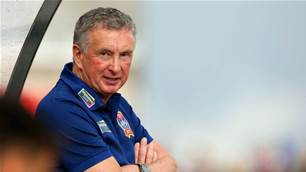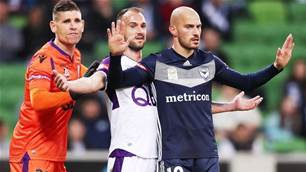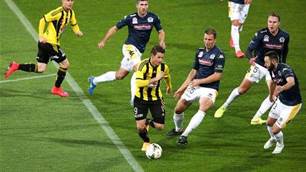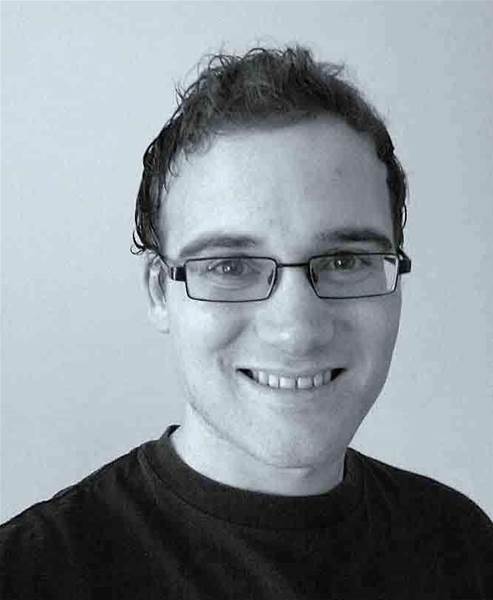Moneybags or moneyball? Which is the way forward for your A-League team?
Financially, things have changed quite drastically down at the Perth Glory offices in the past year or so. The bean counters at Tony Sage's club, once proudly singing a smash hit by ABBA, are now quietly humming the breakout single by ginger-fronted UK group Simply Red.
Ideally, this change of stance should be applauded. In previous years I and many others have bemoaned the amount of money clubs have spent on below-par recruits and ageing journeymen - a criticism I've also often extended to the league, which seems to have wasted money on poor advertising campaigns and ineffective staffers. In recent times though, recruitment has begun to drastically improve at most clubs, with players like Liam Miller, Marcos Flores, and Thomas Broich being a far cry from superstar imports like James Robinson, Mario Jardel, and Brian Deane. Even the FFA began to get the message, with money spent on advertising resulting in 'We Are Football' rather than 'I Am Robot'.
So it does come as a disappointment to many Glory fans that, coming off our best season since the NSL folded and having already lost a giant chunk of the wage budget with the departure of former marquee Mile Sterjovski, we now face a season of cost-cutting and reduced expectations thanks to a tight fiscal policy. Now don't get me wrong - I think that the idea is sound, I just wish it had occurred three to five years ago instead of now. If we'd spent low during poor seasons they'd be less disappointing (e.g. Ron Smith's first year in charge under the FFA) but now, with expectations raised after a grand final appearance, it would seem that limiting our budgets might just hurt our chances of going one better.
For a start, the club has already seen Andrezinho turn down a reduced deal and opt to go elsewhere. On his day he was a livewire and a fan favourite, but clearly his fitness issues and relative lack of defensive awareness counted against him in the end - fair enough. This wouldn't be such a problem if the club had not let go of midfielder Todd Howarth as well; someone who scored the last-minute winner against Wellington to send us into the Preliminary Final, and a handy left-sided utility who added extra depth and cover to the squad on a relatively low wage.
Losing these two players leaves Glory short of wide cover, with Evan Berger remaining the last left winger we have after the departure of Andre, Toddy, Sterj, and the perennially-injured-and-now-retired Victor Sikora. It's the same case on the right, with Travis Dodd now lacking the backup of players like Mile, Tommy Amphlett, and Scotty Neville. It's been said that new recruits Adrian Zahra and Chris Harold can fill these gaps, and perhaps a couple of youth players may now also get a go, but you'd imagine Glory would still be looking for new options to sure up the squad's depth. As such, it does seem odd that Howarth especially was released, given he's capable of filling in at left back as well as the wing; but the player himself commented to the media that he should have seen it coming, as the necessary people at the club had not said anything to him while contract talks should have been happening.
Obviously then, the new approach to finances hasn't always pleased people on the inside of the club. Chris Coyne famously had a go at the club at the club on a Channel Seven interview, deriding the decision-makers for stalling on contract talks with players and the coach. Rumours had also been circulating for some time last season about players simply being ignored by staff when asking about a new deal. In hindsight, Glory can point to a successful finals campaign as vindication that this approach nevertheless worked – and thus, perhaps the old adage 'break a few eggs to make an omelette' thus applies.
Certainly, on a purely objective level, one can understand how losing Scott Neville isn't a problem from a financial point of view - we have an adequate replacement in Josh Risdon who is quite possibly on less money, and it is far from certain that 'Nevs' would have made the starting XI on a regular basis next year. So perhaps this then outweighs the fact that it's gut-wrenching to see a young bloke who gave his all for the purple shirt, and displayed genuine talent and passion during his time here, leave the club. Especially when he leaves the club who developed him to go to an A-League opponent, rather than somewhere overseas.
Also in the club's favour is the fact that the deals struck so far have done little to weaken the club's preferred starting XI:
OUT: Andrezinho, Todd Howarth, Chris Coyne, Josh Mitchell, Adam Hughes, Mile Sterjovski, Adam Taggart, Tommy Amphlett.
IN: Nick Ward, Chris Harold, Adrian Zahra, Ndumba Makeche, Brendan O'Neill
Now Perth have re-signed Steven McGarry then you could easily say that the typical 4-5-1 using the Scotsman or the flatter 4-4-2 using Billy Mehmet hasn't been affected. Remaining in that team, apart from one of the above two, are Danny Vukovic, Dean Heffernan, Steve Pantelidis, Bas van den Brink, Josh Risdon, Jacob Burns, Liam Miller, Evan Berger, Travis Dodd, and Shane Smeltz. With the exception of Berger, who was injured for a good portion of the season, that's basically the team that came so close to upsetting Brisbane in the Grand Final. Nick Ward is a former Perth boy who can provide a good backup option in midfield, and players like O'Neill have already shown they are competent enough to spend time on the park at A-League level.
Thus, when you look at things this way, detached from the pain of losing local players like Neville or stylish wingers like Andre, it looks like the club is actually going about things in a very smart manner. It's almost like Tony Sage sat down and watched 'Moneyball' one evening and decided, "Hang on a sec - I can win the Major League without paying Major League prices!" Credit then must go to people like Glory CEO Paul Kelly for managing to cut player wages whilst (arguably) not impacting the best possible team - even if it means they've annoyed a few people along the way, both inside and outside the club, with the manner in which they've done so.
This then poses an interesting question; should Glory have a reasonably successful season next year - and you would imagine a home final would be the minimum fans would accept - is this 'money tight' way of building a squad the best way to approach the A-League season? After all, Central Coast have won a reputation of being a 'little battler' club that doesn't spend a lot and yet achieves quite a bit; is it time all teams looked at following this lead, in the absence of the new TV deal which, at this point in time, remains only a rumour rather than a concrete agreement.
There are other interesting points that Glory's approach raises as well; the first is how much player loyalty and happiness can be balanced against trimming the fat; and the second concerns how you keep your best young players whilst still keeping a lid on wages. Take for example Josh Risdon. Let's say he has signed a modest contract with the club for the next two years; in those two years he goes on to establish himself as a leading A-League right back. He's not yet at a point where overseas clubs want him, but he's certainly done enough to deserve a substantial raise on his original deal. Where does this leave the club?
Certainly, the last thing that fans wish to see is Glory becoming a production line for Eastern states teams. The success of previously released young players like Eli Babalj and Trent Sainsbury has already caused enough animosity to be directed towards the club's decision makers without players like Makarounas, O'Neill, and Risdon adding to that in a few years' time. How Kelly and Co. approach this problem in the next season or so will make for interesting viewing - especially while some of Glory's more experienced heads remain on the books whilst getting a little older, slower, and injury-prone each year (not to suggest any of them will be past it next season of course.)
The recent re-signing of several young players also flies in the face of another aspect of Tony Sage's drive to save costs - his threats to not field a Youth or Women's team next season. After all, surely these young players couldn't have got where they are today without the grounding they received in the National Youth League. Take that away from them and they are 'mere' state league players - the state league that Glory staffers have said, on numerous occasions, isn't at a high enough level to produce good players for the club. If the club is pinning their hopes on their foray into the league with Inglewood United - where Glory personnel have taken up coaching roles, and some Glory youth players are now plying their trade - then again these young players would only have six months of football a year, even if it is with 'better' coaching and development. Surely then, fielding a youth league team - one that can probably be funded with the salary of ex-marquee Mile Sterjovski - must remain a priority for the club.
All of this will become clearer as the off-season drags on and the new season gets closer. Until then, fans will be keeping a close eye on who Perth recruits – and just how much they’re likely to be paid.
Related Articles

Newcastle Jets 0 Perth Glory 2: Player Ratings

Melbourne Victory v Perth Glory player ratings













